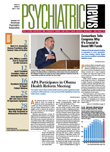Medical student self-reported levels of empathy tend to decrease with time spent in medical training.
Further, for students with longer experience in training, factors affecting interpersonal functioning—such as burnout, time constraints, and patient attitudes—tend to be reported most often as the factors affecting empathy levels.
Those are a few of the conclusions from a survey of medical students and interns at one academic medical center. The student self-reports roughly track previous research findings on empathy that used more objective measures of empathy, said Jeffrey Winseman, M.D., associate director of psychiatry residency training at Albany Medical Center. He conducted the survey along with Victoria Balkoski, M.D., director of psychiatry residency training at Albany.
“Most students' self-reported level of empathy didn't change over the period of training, but if it did change, more often than not it decreased,” Winseman told Psychiatric News. “And as a cohort, the level of empathy decreased from year one to year four.”
Winseman presented the survey results in a poster at last month's meeting of the American Association of Directors of Psychiatric Residency Training in Tucson, Ariz. The poster was titled “Role Modeling, Burnout, Patient Attitudes, and Time Constraints: Medical Students and Interns Tell Us Their Views on Factors Affecting Empathy.”
Winseman said the survey is a prelude to a fuller report that will appear in Academic Psychiatry in November, using “concept mapping” to chart students' self-reports on empathy. Concept mapping is a statistical tool used to derive conclusions from qualitative data, such as subjective responses to a survey.
The researchers undertook the study, he said, after hearing stories anecdotally from medical students about their educational experiences.“ We began to wonder how these experiences were affecting the students' ability to be empathic with the patients they would be treating,” he said.
At the beginning of the 2005-2006 academic year, a “brainstorming survey” was sent by e-mail to all 637 medical students and PGY-1 residents at Albany Medical College. The survey asked for responses to the following statement: “During the course of becoming a doctor, a variety of things occur that affect one's ability to be empathic. Please list all the factors you can think of.”
In addition, participants were asked to indicate whether their level of empathy had increased, decreased, or remained the same and to rate the importance of empathy in a physician.
A total of 293 individuals responded, only 17 of whom were first-year residents. (Because of the small number of residents, there was no way to break down results by specialty.)
The responses included 1,683 “statements” about empathy, most of which were redundant. Those statements were analyzed and synthesized down to 160 “factors” affecting empathy.
There were approximately 20 factors that were frequently listed by respondents, and four were mentioned most often: amount of time spent with patients; being mentally, spiritually, and physically drained by school, stress, and work overload, which the researchers termed as“ burnout”; clinical experience; and “examples set by senior teachers and doctors” (role modeling).
Winseman said the factors affecting empathy varied with year of training, self-reported level of empathy, and gender. For instance, while students in later years emphasized the importance of factors affecting interpersonal functioning, first-year students were more likely to list “understanding disease” as a factor affecting empathy, reflecting those students' efforts to cognitively master the nature of a patient's illness.
Among students whose empathy decreased over time, the most commonly listed factors were burnout, debt, and financial pressures, whereas those whose empathy increased over time listed “understanding disease” and“ clinical experience” as factors.
Women tended to rate empathy higher in importance and to cite illness in family and friends as affecting empathy.
“We think those whose empathy diminished over time seem to be more burdened personally and preoccupied with factors affecting quality of life, while those whose empathy increased were more engaged in the mainstream educational process and may have had more positive role models,” Winseman said. ▪
